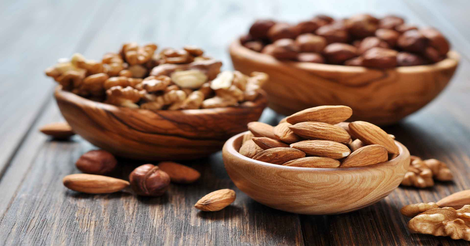As a dietitian, the word “diet” is probably my least favourite word.

I appreciate that for many, this single word can bring up past memories of restriction, guilt, shame, feeling hungry all the time and/or not having the energy to complete simple daily tasks.
So, what is the Portfolio Diet about?
Thankfully, the Portfolio Diet isn’t really a “diet” of restriction – it focuses more on what you should be including in your diet to help lower your cholesterol levels, rather than what you should be excluding. I’m all for long-term habit building and lifestyle change!
Now, let’s say you’ve been introduced to the Portfolio diet by your dietitian as you’ve decided that you’re ready to tackle your high cholesterol levels. But unfortunately, you visit your rheumatologist a couple of days later and are given an inflammatory arthritis diagnosis.
So what do you do?
Do you focus on dietary changes that will help to lower your cholesterol?
Or, do you focus on dietary changes that will help to reduce inflammation?
Let’s take a closer look at the components of the Portfolio Diet and see what the evidence has to say.
The Portfolio Diet encourages you to incorporate 5 key foods into your everyday diet:
- Legumes (for plant protein)
- Soy (for plant protein)
- Nuts and seeds
- Plant sterols
- Viscous fibres (found in oats, fruits, vegetables and barley)
Each of these foods have been shown to positively impact your cholesterol levels, for example, by binding to cholesterol and eliminating it from the body before it can be absorbed. Fortunately, most of these foods actually crossover with our anti-inflammatory guidelines!
Plant proteins (legumes and soy)
Legumes and soy are both a great source of plant protein. We know that excess saturated fat in the diet is strongly associated with increased risk of cardiovascular disease, as well as increased inflammation in the body. By replacing at least some of our animal proteins (such as red meat and poultry) with more plant-based proteins, we can create a more favourable ratio of saturated fat in our diet to have a positive impact on inflammatory disease. Both legumes and soy are linked to lower levels of inflammatory markers, due to their high phytoestrogen and fermentable fibre content. The fermentable fibres in particular are incredibly important for maintaining a healthy gut, and more and more research is showing us that a healthy gut microbiome is associated with lower levels of inflammation.
Nuts and seeds
Nuts and seeds are a great everyday replacement for more processed snacks, such as chips, pastries and sugary muesli bars. All nuts contain very high levels of the healthy, unsaturated fats that I spoke about earlier. Walnuts, flaxseeds and chia seeds in particular are really high in omega-3, which is a potent anti-inflammatory compound that most Western diets tend to lack adequate quantities of. On top of that, nuts have a low GI, meaning that they are a snack options that helps to keep your blood sugars more stable between meals. There is evidence to suggest that large spikes in blood sugar levels and/or chronically high blood sugar levels can actually increase inflammation over time.
Viscous fibres
Viscous fibres from vegetables, fruits, oats, barley and legumes are great for binding to cholesterol and drawing it out of the body. However, these foods are also great sources of micronutrients (such as vitamin C and E), antioxidants, phytoestrogens and resistant starches, and are all low GI food choices. Colourful and deeply pigmented fruits and vegetables are exceptionally high in antioxidants, which help to fight free radicals and reduce damage to cells in our bodies. I always stress to my clients that eating a variety of different colours every day is really important when it comes to fresh produce. Each colour is typically associated with different antioxidants, and they all play different but equally important roles when it comes to reducing inflammation.I hope you are now feeling a little less overwhelmed and a little more empowered to make some positive changes to your diet, which will help reduce your cholesterol levels, reduce inflammation, or even both!
If you would like some tasty recipes to show you some easy ways to add plant proteins, nuts and seeds, and viscous fibres into your diet, take a look at our website, or grab a copy of our cookbook!


